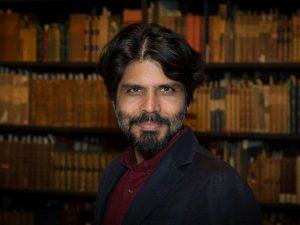Francis Wade in the Los Angeles Review of Books:
FRANCIS WADE: You have emerged as a prominent critic of empire and its foundations in liberal ideas of freedom and progress. Can you outline how your thinking has evolved, from your early writings on the topic to the present, and describe the major events that either reinforced or altered your position?
 PANKAJ MISHRA: I know from experience that it is very easy for a brown-skinned Indian writer to be caricatured as a knee-jerk anti-American/anti-Westernist/Third-Worldist/angry postcolonial, and it is important then to point out that my understanding of modern imperialism and liberalism — like that of many people with my background — is actually grounded in an experience of Indian political realities.
PANKAJ MISHRA: I know from experience that it is very easy for a brown-skinned Indian writer to be caricatured as a knee-jerk anti-American/anti-Westernist/Third-Worldist/angry postcolonial, and it is important then to point out that my understanding of modern imperialism and liberalism — like that of many people with my background — is actually grounded in an experience of Indian political realities.
In my own case, it was a journalistic assignment in Kashmir that advanced my political and intellectual education. I went there in 1999 with many of the prejudices of the liberal Indian “civilizer” — someone who simply assumed that Kashmiri Muslims were much better off being aligned with “secular,” “liberal,” and “democratic” India than with Pakistan because the former was better placed to advance freedom and progress for all its citizens. In other words, India had a civilizing mission: it had to show Kashmir’s overwhelmingly religious Muslims the light of secular reason — by force, if necessary. The brutal realities of India’s military occupation of Kashmir and the blatant falsehoods and deceptions that accompanied it forced me to revisit many of the old critiques of Western imperialism and its rhetoric of progress. When my critical articles on Kashmir — very long; nearly 25,000 words — appeared in 2000 in The Hindu and The New York Review of Books, their most vociferous critics were self-declared Indian liberals who loathed the idea that the supposedly secular and democratic Indian republic, which prided itself on its hard-won freedom from Western imperialism, could itself be a cruel imperialist regime.
More here.
